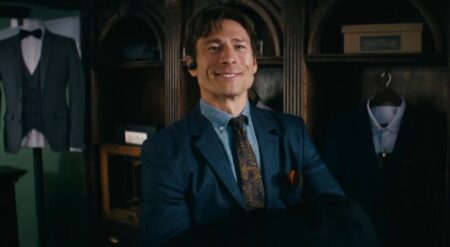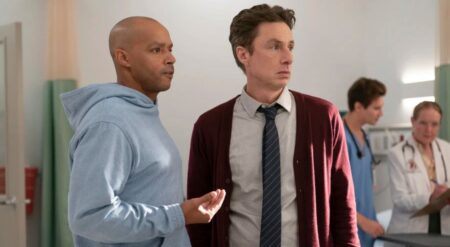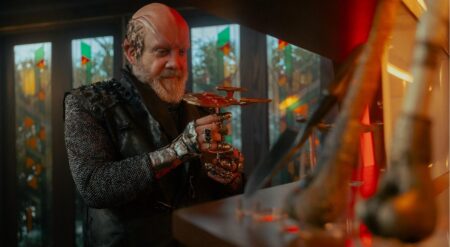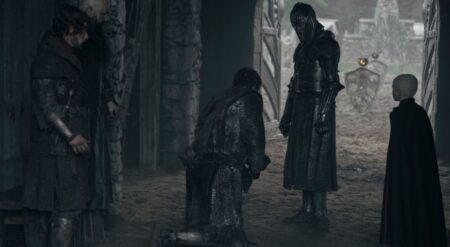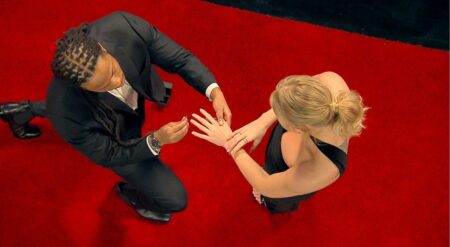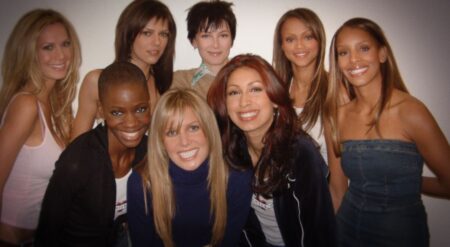
Since I missed my episode 4 recap last week I figured I would jam pack everything into this post. As I’ve talked about before, Harlots is very focused and providing the viewer with a “whore’s-eye-view” of the characters, meaning: we learn the greater story arc, but more-so we learn about how the characters move within it and how they experience life. So, for the remainder of the 8-part series, I’ll be breaking down the recap by what happens with the character as well as the main arc for the episode.
——–As always, spoilers below. ——
In episode 4, with Margaet Wells’ new Greek Street house still struggling to bring in clients, the preacher stands outside yelling to the few clients inside that they have ruined their souls and that they will burn. This is not a great setting for the men coming to have moments of bliss with Wells’ girls. William then gives Margaret an idea: embrace hell. Since, the clients are being told that they are in a house of debauchery, sin, and the devil, Wells decides to embrace it, by throwing a masquerade.
Lydia Quigley: It is becoming clear that although the Quigley House is rich, well-dressed, and seemingly civilized, Dame Death is tricking young virgins, to not only become harlots, but to be used by a secret society made up of the powerful men of London who’s sexual appetite leaves her girls scarred, bruised, and crying. Although she is hesitant, she procures another girl in exchange for the name of a member of society. She also has no regard for the girls that step out of line, selling their bodies to be abused by well-known wealthy clients. We find this out when she Emily Lacey angers her and starved and given to Lord Fallon. After the encounter we see that Fallon has whipped Emily, causing wounds on her. Mary Louise, Quigley’s best girl then tends to Emily’s wounds. Mary Louise is then asked to pass a message to Ms. Wells when at the masquerade. She responds to Emily: “She will kill me.” The episode ends with Quigley losing her best girl, and it seems that the secrets of her house will be given to Wells. And Emily Lacey’s story is going to one of pain, perhaps karmic repercussions for her disloyalty to the Wells’ house.
Lucy Wells: Although Lucy seemed to be the center of the Harlots narrative, she is muted in comparison to the other harlots whose stories are unfolding, like Harriet Lennox and even the evolution of Emily Lacey’s life in the Quigley House. That being said, it was clear in episode one that Lucy wanted the life of a harlot. She wanted to be best one and bring the most money into the house. Now, she can not bring herself to act for her clients. As her mother is still trying to find her a patron, Lucy recoils from their touch. She goes to see her sister and is given tips on how to control and act for her clients. She brings this into her meeting with the noblemen in the poker room with her sister Charlotte and her patron. She uses her wit and resembles her sister, however, she is trying to woo the very man who we know has been beating and raping the women at Quigleys. The episode ends with her finally finishing a client, only it’s Charlotte’s patron George. The proposition itself reminds the viewer that although we are seeing these women and as powerful, they are existing in a world that sees’s them as a service and not as agents possible of choice. She has sex with George because she is told that she owes him since he could not get an erection when he bought her virginity. We will have to see what happens with Lord Fallon, but he seems poised to offer patronage.
Amelia Scanwell: Up until this point, I’m not sure if I’ve mentioned her, the daughter of the preaching woman, Florence Scanwell, the one aimed with tearing down Margaret’s business, she hasn’t been much more than a tool to manipulate her mother into Quigley’s service. In this episode, we get to see action behind the compassionate looks she gives the harlots in the prior episodes. With her mother sick, she is tasked with fetching her medicine. While in the market, she sees one of Nancy Birch’s girls: Violet Cross. She catches Violet pick-pocketing a man. As a harlot and a black woman, it is clear that she expects Amelia to turn her in, but that doesn’t happen. Instead, they bond. With Amelia even accompanying her to a tavern and ultimately to the doors of Hades (the Wells masquerade “orgy”), where shes talks with and is fed by Violet. This ultimately leads to Violet kissing Amelia. Shocked, the preacher’s daughter leaves. Although it isn’t crystal clear whether or not this will blossom into something, it is clear that for Amelia, it is not callousness or “righteous anger” that the harlots need, but empathy.
Harriet Lennox: Now, for my favorite part of the episode. Harriet Lennox. She has become my favorite part of the show. She is fierce and she powerful, even in a situation that has attempted to strip her of her dignity. Having her children ripped away from her, treated as property, and relegated from the mistress of the house to cleaning the chamber-pots of the Wells house, she should be at her lowest. In a way she is, we see her feeling dejected, alone, and without a doubt being reminded of her time in slavery. We see her vulnerability, and in this, we see how she makes her choices. She decides to become one of the harlots, even though she swore to never become a whore. All that being said, when she meets Lord Repton, behind the mask, she plays the part of a goddess, allowing herself to be exoticized to earn money and ultimately buy her children’s freedom. When the enter the bedroom, Repton switches from the predator he was when he interacted with Lucy, into Harriet’s prey. She refuses to give up her power in the exchange and dominates Repton. As Repton begins undressing her and asserting himself, he tells her that he was going to be first. Although Harriet looks uncomfortable and hesitant at first, upon hearing this she says: “You’re a powerful man, I bet you always get what you want…But tonight I am you’re queen and you are my subject and you’re going to do what I want.” As she is escorting Repton out of the room, she runs into her step-son (read: racist asshole son of her dead husband) who says, “I always knew you were a whore.” In response, she is not shamed, she is not sad, and instead, she moves right up to him and says “for the first time in my life, I am paid.” And the mic dropped across TV screens and I realized how good Harlots still is half-way through the season.
As an audience, we obviously are meant to cheer for these women. In episode 4, We are meant to see their power, agency, and strength. However, we are constantly reminded that in the culture of 18th century London, they have no power. They are subjects to men who will always be able to leave the brothel and at worst will face the ire of their wives or the preachers and at best can buy and abuse any woman they see fit. We are watching these women survive and find their power, like Harriet, but at the same time, he children are still being held as property and she must either relive the work of her enslavement or sell her body. Ideas of power and who has it are constantly in flux as the camera moves through different settings. Even the renowned Lady Quigley must bend to the will of her customers. This is why I love Harlots.
Photos courtesy of Hulu. Harlots is available for streaming on Hulu and new episode air every Wednesday.

